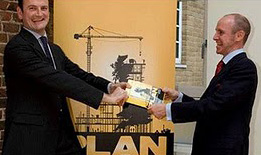Britain. After 55 years seeking a role again.
My hotel here in Dhaka is
in the diplomatic district of the city. Across the road construction work is
underway on a large new building which the boards outside reveal to be the “Franco German Embassy”. No doubt the
rabid haters of all things European will feel that this initiative confirms
their worst fears. For if two nations which spent the first half of the
twentieth century fighting one another can now be sufficiently close that they share
an Embassy can the first “European Embassy” be far behind? Along with, of
course, the “European
Super State”
about which they so noisily complain. In the long term probably not, I would
think, and that’s something to cheer on not to jeer about.
The new Embassy is an overtly political symbol – though
there will be sound economic reasons as well. The costs of the construction and
operation of the Embassy will be shared – not least the costs of security. High
these days anywhere, but particularly so in Bangladesh. But the symbolism is
the real reason. If the French and the Germans share an Embassy that can only
be on the foundation of also sharing a foreign policy and the reality is that that
policy is not just theirs, but Europe’s as a
whole.
When you have a broad-based coalition of 28 sovereign states
there can’t be major differences of approach to international relations. The EU
is not just an economic union, it is a political one as well. And you cannot
have such a union if its member states disagree strongly with one another about
external affairs. That there is common interest across Europe is fairly
self-evident – even, I would argue, including the United Kingdom. Britain’s foolish and deadly adventure in Iraq, which was
not supported by any of our European partners, was a blip in pan-European
unity. But more than a decade later there is a greater spirit of cooperation
across the EU’s 28 member states and only insular and petty nationalism could
block the inevitability of “ever closer union”.
There is nationalism in pockets across Europe
and that has led to the rise of parties of the extremes of Right and (in some
cases) Left. There is no room for
complacency about this – history teaches us that in times of difficulty the
extremes can prosper. The disadvantaged in America
who will vote for the simplistic, banal nationalism of Donald Trump are not far
removed from those who believed the snake oil of Britain’s United Kingdom
Independence Party (UKIP) and of the others who ran a disreputable and
xenophobic campaign during the EU Referendum earlier this year. Nationalism does
not just require the crude and maudlin portrayal of national symbols – the
flag, sentimental anthems, the currency, reverence for institutions like the
monarchy, nostalgia and reliving past glories –it also requires scapegoats.
These are, of course, people and institutions that are external to the core of
the nation and its history and who can be blamed for its ills. For Trump it’s
Muslims and Mexicans (etc.). For UKIP and its fellow travellers it is the
European Union, as an entity, and its officials as individuals – and, of
course, foreigners in general and immigrants in particular. And for Hitler it
was the Jews. Any study of the malevolence of Nationalism is also a study of
bigotry, prejudice, intolerance and chauvinism. Patriotism is the veneer which
barely disguises Nationalism. That patriotism is the “last refuge of a
scoundrel”, as Samuel Johnson put it, we have evidence in abundance in Britain in
2016.
The opposite of Nationalism is Internationalism. That
principle lay at the heart of Churchill’s call in 1946 “… to re-create the European Family… and provide it with a structure
under which it can dwell in peace, in safety and in freedom. We must build a
kind of United States of Europe.” That is precisely what the European Union
has done and is doing. This does not mean a Federal Europe and certainly not a
“Super State” – except perhaps in the very long
term. But it does mean closer union and also to a post-NATO European Defence
Force as guarantor of the “peace and safety”. That the United Kingdom
has chosen to be outside of this progress is distressing – the wrong decision,
made for the wrong reasons at the wrong time. Churchill did not see Britain as being part of his united Europe – but
that was a different Britain.
In 1946 we were still Imperial Britain, a “Great Power” and the United States’
closest ally. None of that now applies. And when in 1962 Dean Acheson said “Great Britain has lost an Empire
and has not yet found a role” he was pointing to this emerging reality.
The answer to the question of what Britian’s ideal post-Imperial
role would be was arguably clear just before Acheson said what he said. In 1961
The UK applied to be a member of the then “European
Economic Community”. At the time Macmillan acknowledged that the
EEC was more than “just” an economic entity. He said:
“This is a political as well as an economic issue. Although the Treaty
of Rome is concerned with economic matters it
has an important political objective, namely, to promote unity and stability in
Europe which is so essential a factor in the
struggle for freedom and progress throughout the world”
By applying for EEC membership the UK’s
post-Imperial role was effectively being prescribed. It was to be, along with Germany and France, one of the leaders in a
United Europe. This may well be why General de Gaulle initially rebuffed the
application! But in a few years time, and post de Gaulle, the UK took its rightful place (many would say)
among the leaders of the new Europe.
In a parallel world the new Embassy in Dhaka
would be the “British Franco German Embassy” – a reflection of the progress
made in European cooperation and of the tripartite drivers of it. Fanciful? No
more so than the reality of the “Franco German Embassy” surely.
But now what? It took fifteen years for Britain to realise that to be part of the new Europe – indeed to be a key player in building it – was
the right thing to do. Fifty-five years later, with much of the hard work of
unification having been done and (especially) with democratic intuitions having
been successfully introduced, we have decided to walk away. To what? Well
nobody knows – least of all the Government wrestling with the enormity of what
we’ve done. The clock cannot be rolled
back to 1946, or indeed to 1961. This is a Club which once you’ve left you
can’t rejoin.
There is no Bliss in this new dawn to be alive, and for the young
especially it is very hell. It was the meagre, stale, forbidding ways which got
us here and the false and nationalistic “attraction” of a country in romance
with its past. Sadly Reason failed to assert her rights. She was lost to the
forces that would not go forward in her name.






